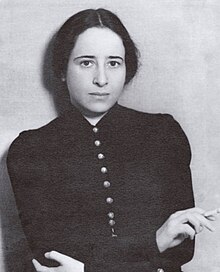 Global Information
Global InformationHannah Arendt information
Hannah Arendt | |
|---|---|
 Arendt in 1933 | |
| Born | Johanna Arendt 14 October 1906 Linden, Province of Hanover, Kingdom of Prussia, German Empire |
| Died | 4 December 1975 (aged 69) New York City, U.S. |
| Resting place | Bard College |
| Other names | Hannah Arendt Bluecher |
| Citizenship |
|
| Education |
|
| Notable work | List
|
| Spouses | Günther Anders
(m. 1929; div. 1937)Heinrich Blücher
(m. 1940; died 1970) |
| Relatives |
|
| Region | Western philosophy |
| School | List
|
| Doctoral advisor | Karl Jaspers[6] |
Main interests | Political theory, theory of totalitarianism, philosophy of history, theory of modernity |
Notable ideas | List
|
| Signature | |
| Part of the Politics series |
| Republicanism |
|---|
|
|
Hannah Arendt (/ˈɛərənt, ˈɑːr-/,[9][10] US also /əˈrɛnt/,[11] German: [ˌhana ˈaːʁənt] ⓘ;[12] born Johanna Arendt; 14 October 1906 – 4 December 1975) was a German-American historian and philosopher. She was one of the most influential political theorists of the 20th century.[5][13][14]
Her works cover a broad range of topics, but she is best known for those dealing with the nature of power and evil, as well as politics, direct democracy, authority, and totalitarianism. She is also remembered for the controversy surrounding the trial of Adolf Eichmann, for her attempt to explain how ordinary people become actors in totalitarian systems, which was considered by some an apologia, and for the phrase "the banality of evil." She is commemorated by institutions and journals devoted to her thinking, the Hannah Arendt Prize for political thinking, and on stamps, street names, and schools, among other things.
Hannah Arendt was born to a Jewish family in Linden (now a district of Hanover, Germany) in 1906. When she was three, her family moved to the East Prussian capital of Königsberg for her father's health care. Paul Arendt had contracted syphilis in his youth but was thought to be in remission when Arendt was born. He died when she was seven. Arendt was raised in a politically progressive, secular family, her mother being an ardent Social Democrat. After completing secondary education in Berlin, Arendt studied at the University of Marburg under Martin Heidegger, with whom she had a four-year affair.[15] She obtained her doctorate in philosophy at the University of Heidelberg in 1929. Her dissertation was entitled Love and Saint Augustine, and her supervisor was the existentialist philosopher Karl Jaspers.
Hannah Arendt married Günther Stern in 1929 but soon began to encounter increasing antisemitism in 1930s Nazi Germany. In 1933, the year Adolf Hitler came to power, Arendt was arrested and briefly imprisoned by the Gestapo for performing illegal research into antisemitism. On release, she fled Germany, living in Czechoslovakia and Switzerland before settling in Paris. There she worked for Youth Aliyah, assisting young Jews to emigrate to the British Mandate of Palestine. She was stripped of her German citizenship in 1937. Divorcing Stern that year, she then married Heinrich Blücher in 1940. When Germany invaded France that year she was detained by the French as an alien. She escaped and made her way to the United States in 1941 via Portugal. She settled in New York, which remained her principal residence for the rest of her life. She became a writer and editor and worked for the Jewish Cultural Reconstruction, becoming an American citizen in 1950. With the publication of The Origins of Totalitarianism in 1951, her reputation as a thinker and writer was established, and a series of works followed. These included the books The Human Condition in 1958, as well as Eichmann in Jerusalem and On Revolution in 1963. She taught at many American universities, while declining tenure-track appointments. She died suddenly of a heart attack in 1975, at the age of 69, leaving her last work, The Life of the Mind, unfinished.
- ^ Allen 1982.
- ^ Bowen-Moore 1989, p. 119.
- ^ Kristeva 2001b, p. 48.
- ^ Lovett 2018.
- ^ a b c d'Entreves 2014.
- ^ Grunenberg 2017, p. 3.
- ^ Yar 2018.
- ^ Fry 2009.
- ^ "Arendt". The American Heritage Dictionary of the English Language (5th ed.). HarperCollins. Retrieved 30 June 2019.
- ^ "Arendt". Collins English Dictionary. HarperCollins. Archived from the original on 30 June 2019. Retrieved 30 June 2019.
- ^ "Arendt". Merriam-Webster.com Dictionary. Retrieved 30 June 2019.
- ^ Duden 2015, p. 199.
- ^ Winston, Morton (February 2009). "Hannah Arendt and the Challenge of Modernity: A Phenomenology of Human Rights by Serena Parekh". Human Rights Quarterly. 31 (1): 278–282. doi:10.1353/hrq.0.0062. JSTOR 20486747. S2CID 144735049.
- ^ "Remembering the Theorist of the Banality of Evil". Deutsche Welle. 14 October 2006. Archived from the original on 25 April 2023. Retrieved 3 June 2022.
- ^ Jones, Josh (10 May 2017). "The Love Letters of Hannah Arendt and Martin Heidegger". Open Culture. Archived from the original on 10 June 2023. Retrieved 15 November 2023.